Stay Protected Anywhere: Best medical alert system with fall detection and GPS IN 2024
GPS-enabled medical alert systems have emerged as lifesaving devices, allowing users to call for help with a simple push of a button. These systems are even more advanced now, with fall detection capabilities that automatically send alerts when a fall is detected, ensuring help is on the way even if the user cannot press the button.
Brio House is an independent review site. We may earn money when you click links inside our site.
Technology is the guardian angel for our health and well-being in today’s era. GPS-enabled medical alert systems have emerged as lifesaving devices, allowing users to call for help with a simple push of a button. These systems are even more advanced now, with fall detection capabilities that automatically send alerts when a fall is detected, ensuring help is on the way even if the user cannot press the button.
Importance of the Right Medical Alert System
The importance of the right medical alert system is multifold. Here are some key reasons why choosing the correct system is essential:
Emergency Assistance
A medical alert system provides immediate access to help in the event of a medical emergency. If a user experiences a fall, health crisis, or other emergency, they can quickly alert professionals who can dispatch emergency services.
Fall Detection
Falls are a significant risk, especially for seniors. The right medical alert system often comes with automatic fall detection, notifying emergency services even if the individual cannot physically press the alert button.
Mobility and Independence
With a medical alert system, individuals, particularly seniors or those with medical conditions, can maintain their independence and continue living in their own homes while still having access to emergency assistance when needed.
GPS Location Tracking
For active individuals who are often out and about, a medical alert system with GPS tracking can pinpoint their exact location in case of emergencies. This feature is crucial in providing timely help, especially when the user cannot communicate their location.
Peace of Mind
Knowing that their loved one has a reliable medical alert system for family members and caregivers can provide significant peace of mind. They can be confident that help will be available promptly in an emergency.
24/7 Monitoring
Most medical alert systems offer round-the-clock monitoring. This constant vigilance means that the user can receive immediate assistance no matter when an emergency occurs.
Personalized Response
Many medical alert systems can be customized with the user’s medical information, allowing emergency responders to provide the most appropriate care based on the individual’s specific needs and conditions.
Therefore, choosing the right medical alert system is crucial. The best system will depend on the user’s specific needs, lifestyle, and budget. Factors to consider include the system’s features, such as fall detection and GPS tracking, the cost, the provider’s reputation, and the system’s ease of use.
Role of GPS Technology and Fall Detection in Medical Alerts

GPS technology and fall detection play significant roles in enhancing the effectiveness and reliability of medical alert systems. Here’s how:
GPS Technology in Medical Alerts:
- Location Tracking: GPS technology is used in medical alert systems to track the user’s location. This allows emergency responders to quickly and accurately locate the individual, even if they cannot communicate their whereabouts. This is particularly important for users who frequently leave their homes or might become disoriented due to a medical condition.
- Mobility: GPS technology supports mobility. Traditional, landline-based medical alert systems limit users to their homes, but GPS-enabled devices allow users to move freely outdoors and in the community while still having access to emergency assistance.
- Geo-Fencing: Some GPS-enabled medical alert systems offer geo-fencing features. These allow caregivers or family members to set up safe zones for the user, and they’re notified if the individual leaves this area. This feature can be particularly helpful for users with Alzheimer’s or dementia who might wander.
Fall Detection in Medical Alerts:
- Automatic Alerts: Fall detection technology can automatically sense if a user has taken a fall and will send an alert to the monitoring center. This is crucial if the fall leaves the user incapacitated or unable to press the emergency button themselves.
- Reducing Response Time: By automatically detecting falls, these systems can reduce emergency response time. Faster response times can be critical in severe situations, like strokes or heart attacks, where quick medical intervention can significantly improve outcomes.
- Safety for High-Risk Individuals: Fall detection is particularly beneficial for individuals with a high risk of falling, such as those with balance issues, mobility impairments, or certain medical conditions. It adds an extra layer of protection and safety for them.
- Peace of Mind: Knowing that a fall will automatically trigger an alert can provide the user and their family members or caregivers peace of mind.
GPS technology and fall detection significantly enhance the safety and efficiency of medical alert systems, ensuring users receive prompt and appropriate help when needed.
Essential Features of Best Medical Alert Systems with Fall Detection and GPS
GPS Tracking and Advanced Location Tracking
A top-notch medical alert system will offer precise GPS tracking. This technology provides advanced location tracking capabilities, allowing emergency responders to pinpoint your exact location in an emergency. This is especially useful when the user cannot communicate or doesn’t know their exact location. This feature is not just for those who travel frequently but also serves as an added layer of protection for those who go on walks or runs around the neighborhood.
Automatic and Optional Fall Detection Feature
The best medical alert companies offer devices with automatic fall-detection features. This feature uses sensors to detect when a user has taken a fall, then automatically sends an alert to the monitoring center. Some systems offer this as an optional feature that can be added for an additional fee. This is an essential feature, particularly for older adults at a higher risk for falls and may not be able to call for help manually after a fall.
Battery Life and Device Durability
Battery life is another crucial factor to consider. The best medical alert systems have a long-lasting battery, ensuring the device is always ready for use in an emergency. Moreover, the devices should be robust and waterproof, allowing users to wear them in the shower or rain, as these are places where falls often occur.
Two-Way Speaker for Emergency Communication
An efficient medical alert system provides a two-way speaker for immediate communication with the emergency call center. This feature ensures that help is only a button press away and allows the user to communicate their emergency to the responder directly, providing essential details to help them receive the appropriate assistance.
Caregiver App and Caregiver Tracking Features
Top-rated medical alert systems also offer caregiver apps, which allow family members or caregivers to monitor the user’s status. These apps may provide real-time updates, such as the user’s location, and alert the caregiver if the medical alert device has been activated. Some systems also include caregiver tracking features, which can send caregivers notifications about the user’s routine and alert them to any unusual activities or deviations from their normal routine. This feature helps provide peace of mind to family members and caregivers, knowing they can respond quickly if an emergency arises.

What should I look for in a medical alert company?
When choosing a medical alert company, look for transparent pricing with no hidden fees, good customer reviews, reliable 24/7 monitoring, high-quality equipment, reasonable contract terms, and responsive customer service.
What are the Best GPS-Enabled Medical Alert Systems with Fall Detection in 2024?
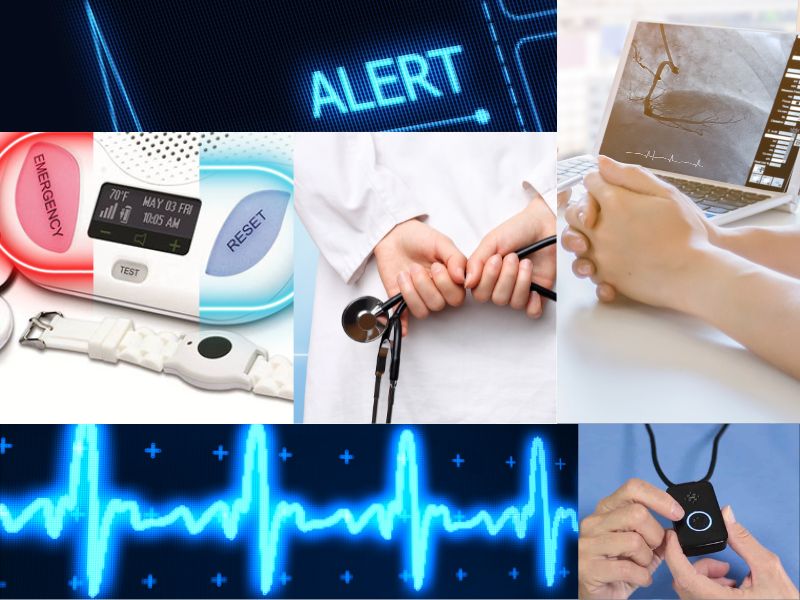
Comparing the Best Medical Alert System with Fall Detection and GPS in 2024
1. Medical Guardian: A Leader in GPS Medical Alert Devices
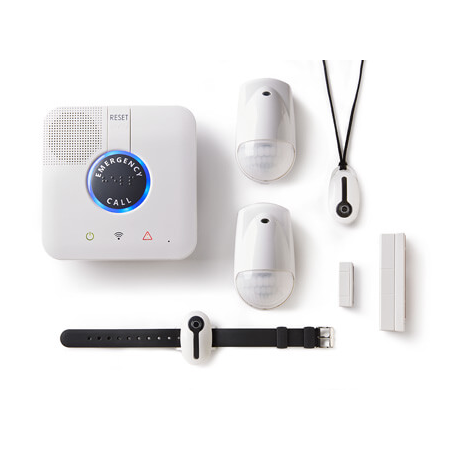
Medical Guardian
Our Rating:

4.8
Medical Guardian stands out as a leader in the field, offering a comprehensive suite of medical alert systems with advanced GPS technology and optional fall detection. Their devices are known for their extended battery life, precise location tracking, and user-friendly design.
Key Features:
- Advanced GPS technology
- Optional fall detection
- Extended battery life
- Precise location tracking
- User-friendly design
PROS
CONS
2. Bay Alarm Medical: Trustworthy and Efficient Alert Systems with GPS
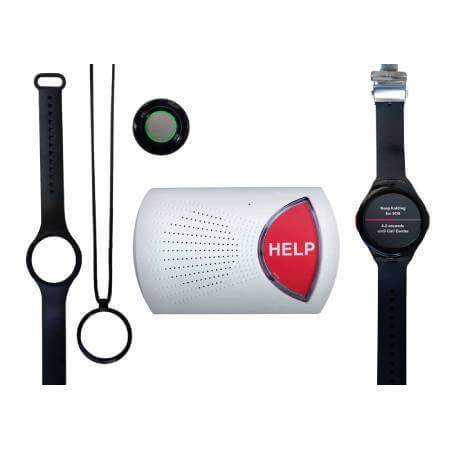
Bay Alarm Medical:
Our Rating:

4.7
Bay Alarm Medical Company is synonymous with trust and efficiency. They provide medical alert systems equipped with reliable GPS tracking and fall detection. With its excellent customer service and the option for a cellular connection, Bay Alarm is an excellent choice for those wanting an efficient and trustworthy medical alert system.
Key Features:
- Reliable GPS tracking
- Fall detection
- Excellent customer service
- Cellular connection options
- Efficient and rapid response times
PROS
CONS
3. Medical Care Alert: Best for Seniors
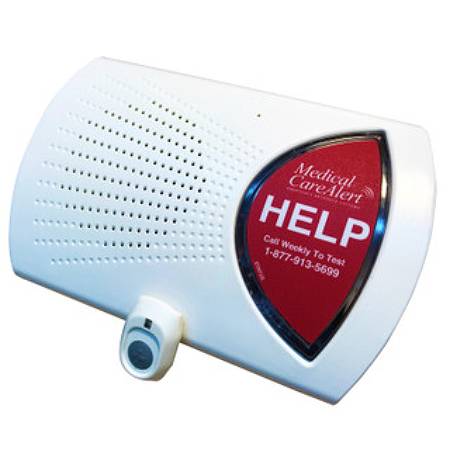
Medical Care Alert
Our Rating:

4.6
Medical Care Alert caters specifically to the senior demographic. They offer user-friendly medical alert devices equipped with GPS technology and fall detection. Their emergency call center provides 24/7 monitoring, ensuring that seniors can always reach out for assistance, regardless of the time or location.
Key Features:
- User-friendly devices
- GPS medical alert systems
- Fall detection
- 24/7 monitoring
- Superior emergency response center
PROS
CONS
4. Get Safe: Best for Caregivers
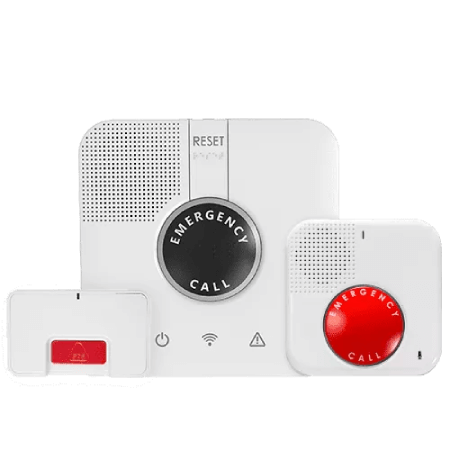
Get Safe
Our Rating:

4.7
Get Safe is a fantastic choice for caregivers who want to stay updated about their loved one’s well-being. The alert systems from Get Safe come with a feature-rich caregiver app, real-time alerts, and two-way communication. They offer both home-based and mobile devices, ensuring round-the-clock safety.
Key Features:
- Caregiver app with real-time alerts
- Two-way communication
- A home-based and mobile medical alert system
- Voice-activated console
- Non-invasive monitoring solutions
PROS
CONS
5. ADT Medical Alert: Best for Value for Money
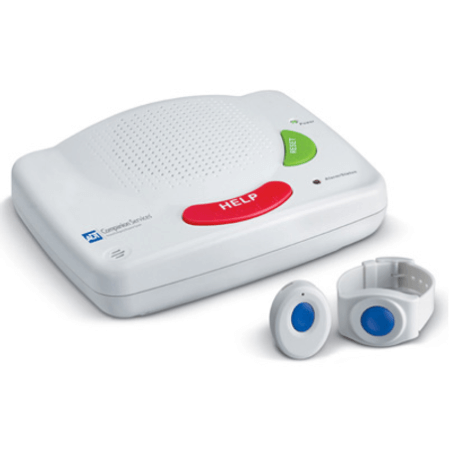
ADT Medical Alert
Our Rating:

4.6
ADT Medical Alert provides a mix of affordability and quality. While it offers high-end features like GPS tracking and fall detection, the costs are lower, providing value for money. They have flexible plans and no long-term contracts, making it a viable choice for those on a tight budget.
Key Features:
- GPS medical alert device tracking
- Fall detection
- Flexible plans
- No long-term contracts
- High-quality equipment
PROS
CONS
Comparing the Most Medical Alert Systems on Features, Price, and Customer Satisfaction
When comparing different medical alert systems, it’s vital to consider key factors like features, price, and customer satisfaction. Each of the mentioned providers has its unique strengths. While Medical Guardian leads with advanced technology, Bay Alarm is known for its trustworthiness. Medical Care Alert is perfect for seniors, Get Safe offers caregiver-centric features, and ADT presents a cost-effective solution.
Assessing customer reviews and satisfaction rates, along with the device costs and features, can help users choose the right medical alert system based on their specific needs.
Breakdown of Best Medical Alert Systems: In-Home and On the Go Systems
At Home Systems: Fall Detection Devices and Voice Activated Wall Buttons
At-home medical alert systems are designed for those who spend most of their time at home. These systems often include fall detection devices that can be worn around the neck or wrist, and they alert emergency services automatically if a fall is detected.
Some systems also offer voice-activated wall buttons that can be installed in high-risk areas, such as bathrooms and stairways. These devices ensure that help is available at the press of a button or voice command, providing a critical safety net within the home.
On-the Go Systems: Mobile Medical Alert Devices and GPS Medical Alert Devices
On-the-go systems are designed for active individuals who frequently leave their homes. These mobile medical alert devices come equipped with GPS technology, ensuring the user can be located in an emergency, regardless of where they are. The devices can be conveniently carried around in a pocket or purse or worn as a pendant, providing safety and assurance on the move.
Mobile Devices versus Traditional Medical Alert Devices: Which is Best for Fall Detection and GPS?
Deciding between mobile and traditional medical alert devices often comes down to the lifestyle and needs of the user. Both types of devices come equipped with fall detection and GPS, but they differ in their functionality and range. Here’s how they compare:
Mobile Medical Alert Devices
Best for: Users who are frequently on the move, lead active lifestyles, or travel frequently.
Key Features:
- GPS Tracking: Mobile devices use GPS technology to determine the user’s location, no matter where they are. This allows emergency services to locate the user quickly in the event of an emergency, even if the user is away from home.
- Fall Detection: Fall detection is often included in mobile medical alert devices. This means that if the user falls, the device can automatically alert the monitoring center, even if the user is unable to do so themselves.
- Portability: These devices are designed to be compact and easy to carry, often in the form of wearable technology such as a pendant or wristband.
Pros: Flexibility and freedom of movement, broad range of use, automatic location updates, suitable for active people or those who travel frequently.
Cons: May require more frequent charging due to GPS and cellular connectivity, may have a higher monthly fee due to the additional technology required.
Traditional Medical Alert Devices
Best for: Users who spend most of their time at home or have limited mobility.
Key Features:
- In-Home Range: Traditional medical alert devices work within a certain range of the base station, typically around the home. They are best for users who spend most of their time at home.
- Fall Detection: Like mobile devices, many traditional devices also come with fall detection features, allowing the monitoring center to be alerted if a fall occurs within the home.
- GPS Tracking: Some traditional medical alert systems may also incorporate GPS technology, although its usage is primarily for in-home scenarios and is not intended for tracking outside the home.
Pros: Usually have longer battery life, less maintenance (no need for regular charging), often easier to use with larger buttons and simpler interfaces.
Cons: Limited to use within a specific range of the base station, not suitable for active users who frequently leave the house, may lack advanced features of mobile systems.
The best device for fall detection and GPS depends largely on the individual user’s lifestyle and personal needs. Active users who frequently leave their house may benefit most from a mobile medical alert device, while those who spend the majority of their time at home may find a traditional device more suitable.
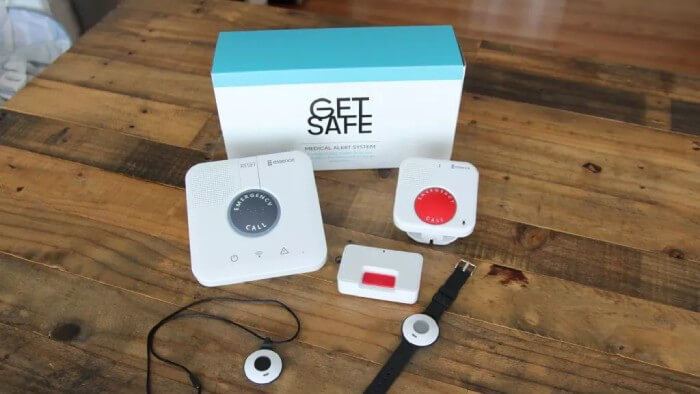
Important Considerations when Choosing a Medical Alert System
False Alarms and How Best GPS Medical Alerts Handle Them
While medical alert systems are designed to ensure safety, they may occasionally generate false alarms due to a device malfunction or user error. The best medical alert systems have protocols in place to handle these situations. Typically, the user or the emergency contact will be contacted first to confirm if there’s a genuine emergency. This reduces unnecessary dispatches and maintains the system’s reliability and credibility.
Cellular Connection Requirements and Limitations
Some medical alert systems rely on a cellular connection to send alerts and for GPS location tracking. Therefore, it’s crucial to understand the requirements and limitations of such systems. If the device uses a cellular connection, ensure it’s compatible with the cell service in your area. Remember that these systems might not work effectively in areas with poor cellular coverage.
Long-Term Contracts and Price Lock Guarantee Options
Contract terms and pricing are essential considerations. While some companies require long-term contracts, others offer month-to-month options, which can provide greater flexibility. Additionally, some companies offer a price lock guarantee, ensuring the monthly price won’t increase. Understanding these terms can help you avoid unexpected costs and ensure you get a fair deal.
Emergency Services and Response Time from Emergency Responders
The efficiency of a medical alert system greatly depends on the promptness of emergency services and their response time. Look for systems with 24/7 monitoring and a reputation for swift response times. Reviews and testimonials can provide valuable insights into the experiences of other users, helping you assess the reliability and efficiency of the emergency response.
The Future of Medical Alert Systems
Advanced Features like Medication Reminders and Family Member Notifications
As technology evolves, we can expect medical alert systems to become even more feature-rich. Advanced features like medication reminders and family member notifications will likely become standard. With medication reminders, users can receive alerts when it’s time to take their medicine, enhancing their health management. Family member notifications can keep loved ones informed about the user’s status, increasing their peace of mind.
Future Developments in GPS Systems and Global Positioning System Accuracy
The future of medical alert systems also lies in further advancements in GPS technology. While current systems can pinpoint a user’s location, future enhancements may provide even greater accuracy, reducing the search radius and ensuring quicker help during emergencies. We may also see improvements in the device’s battery life and size as GPS technology evolves.
Potential for AI and Machine Learning in Automatic Fall Detection
Artificial Intelligence (AI) and Machine Learning (ML) have vast potential to enhance automatic fall detection. These technologies can improve fall detection accuracy by analyzing user behavior patterns and movement, minimizing false alarms. They could also predict falls by detecting changes in the user’s gait or stability, enabling preventive measures. Integrating AI and ML in medical alert systems is a promising direction for the future, potentially transforming how we manage personal safety and emergency response.
The Bottomline:
While considering various features and offerings is important, affordability is key to choosing the right medical alert system. Look for options that offer a balance between comprehensive features and cost-effectiveness. Some providers offer flexible plans and no long-term contracts, providing a more affordable and adaptable solution.
GPS and fall detection is crucial in emergency situations, ensuring help arrives swiftly and accurately. GPS enables emergency responders to locate the user, while fall detection alerts the monitoring center automatically in the event of a fall – even if the user can’t reach their device. As we move forward, technology will continue to enhance these systems, improving their accuracy, reliability, and utility, ultimately offering users greater peace of mind and safety.
